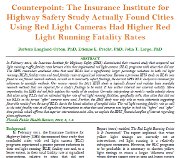1/26/2012
Peer Reviewed Study Questions IIHS Red Light Camera ReportFlorida Public Health Review finds insurance industry study actually proved increase in fatalities in red light camera cities.

The Insurance Institute for Highway Safety (IIHS) grabbed headlines last February with a self-published study claiming installation of red light cameras nationwide would have prevented 815 deaths (view study). The Florida Public Health Review, a peer-reviewed journal, published a systematic critique yesterday that found the methods used in the IIHS report were sloppy and inconsistent, reflecting a bias towards the insurance industry that IIHS serves.
University of South Florida Professors Barbara Langland-Orban, Etienne E. Pracht and John T. Large noted that IIHS did not study individual intersections that had cameras but rather used city-wide data that ignored other engineering variables that could have explained increases or decreases in accidents from year to year. Worse, the study did consider variables such as "land area" and "persons per square mile" which have never been shown through scientific research to have any correlation to motor vehicle crashes. The way these unexplained variables were used introduced other difficulties in the IIHS report.
"Assuming that the dependent variable for each model is defined as reported, some variables are included more than one time, making them redundant," the USF researchers wrote. "For example, population is the denominator in both outcome measures reported (e.g., fatalities per 100,000-population), as well as a numerator in the variable 'population per square mile.'"
The critique noted the most troubling issue was the dissimilarity between the cities chosen to represent camera enforcement and the camera-free cities. Almost a quarter of the camera-free cities had between zero and two red light running fatalities in the "before" period. It is impossible for a city with zero fatalities "before" to improve in the "after" period. By contrast, nearly all the camera cities had 7 or more fatalities, leaving far more room for improvement.
"The fact that the two groups have a large difference in fatality rates in the 'before' period reflects bias in the selection of the comparison group, which jeopardizes the validity of the findings," the USF researchers noted.
The USF researchers then used the IIHS data in an attempt to replicate the IIHS statistical analysis. The critique concluded that IIHS failed to disclose results that contained negative values for red light cameras.
"Thus, cities using cameras are estimated to have a 25 percent higher red light running fatality rate in the 'after' period relative to cities not using cameras, despite the greater reported percent reduction in the former," the critique found.
To account for the bias, the USF researchers pointed out that in several states, insurance companies make money by charging higher premiums to drivers who get photo tickets. Contrary to the common wisdom, insurance companies do not earn less money when accidents increase.
"Insurance companies are able to gain approval from state regulators to raise insurance premiums to cover higher losses, making them indifferent about loss prevention, since increased losses justify increased premiums, passing higher crash costs on to drivers," the USF report stated. "Second, automobile insurance companies earn more profit from investment income (investing premiums collected from drivers) than from underwriting activities."
A copy of the study is available in a 170k PDF file at the source link below.


